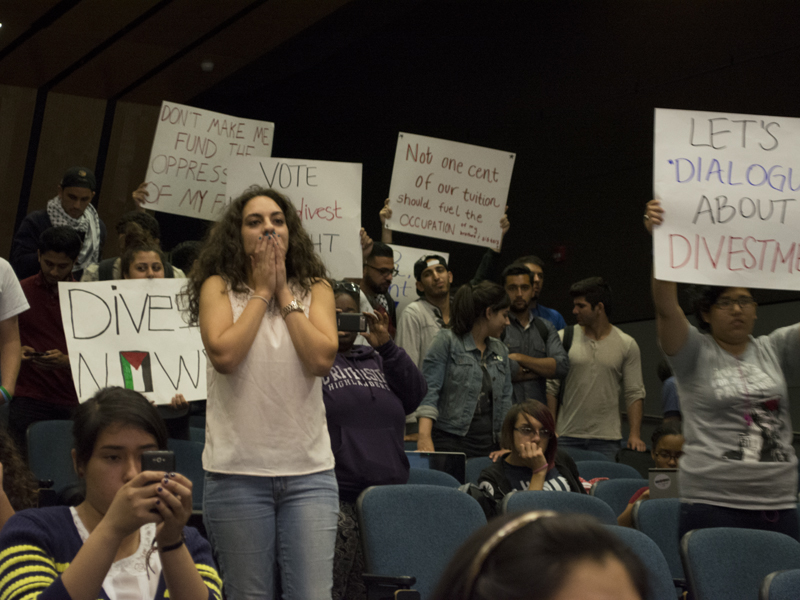
Emotions were high when senate resolution 18 (SR 18), calling for divestment from companies that allegedly profit from human rights abuses against the Palestinian people, scraped past the ASUCR senate at a close margin of 8-7-0. The resolution, spearheaded by Students for Justice in Palestine (SJP), was voted under a secret ballot vote and drew over 150 audience members from the UCR community.
The senate meeting was temporarily relocated to the University Lecture Hall to accommodate the outpouring of audience members, last seen at the last divestment meeting back in February. At the time, senators controversially divided the audience by “pro-” and “anti-” divestment sides prior to voting on a similar divestment resolution that ultimately failed to pass.
During last week’s meeting, SJP representatives Tina Matar, Arman Azedi and ASUCR Senator Shadi Matar delivered a presentation, arguing that the aims of bill were to dissociate the UC and UCR from companies such as Caterpillar and Cemex.
“This is a student issue,” stated Tina Matar. “We pay tuition, we pay the UC fees, we are UC students (and) we should have a say where our money goes.” The representatives stated that the bill was not an attack on Israel or singling out of students, but rather of corporations profiting from Palestinian human rights violations.
Signs and Palestinian flags often flew up from the pro-divestment audience members, while only a trickle accumulated from those against the resolution.
Shadi Matar argued against an existing “double standard” when it came to delivering any pro-Palestinian or pro-divestment resolution that is seen as divisive.
“We have to contact the people who are against (the resolution), we have to make sure that they’re okay with the presentation,” Matar expressed. “We basically have to meet them halfway when they’re not putting the same efforts toward us.”
As a resolution supported by a Palestinian-backed Boycott, Divestment and Sanctions (BDS) movement, Shadi Matar further explained the cause as a “peaceful” one. “BDS has rules, you cannot target individuals with this boycott; you cannot target the people, you can only target corporations and institutions,” said Matar.
The key tenants to ending the BDS movement include: ending the alleged Israeli military occupation by disbanding the wall, acknowledging the fundamental rights of Palestinian Arabs in Israel and granting Palestinians passage to lands they previously occupied.
The wall is a barrier in the West Bank of Israel that separates the region from the Palestinian territories. According to Israel, the purpose of it is to protect Israeli civilians from terrorist attacks; however, there is much controversy regarding its creation as it prevents Palestinians from entering the West Bank.
President of Highlanders for Israel (HIFI), Benjamin Morag, echoed much of the concerns from the anti-divestment side and said that the rewritten, “watered-down” resolution was biased against Israel due to its underlying support from the BDS movement. Morag also described the Israeli-enforced checkpoints and the wall dividing Israel and Palestine as saving multiple Israeli lives.
“When we make a resolution as an institution … that says that what (the people of Israel are) doing to defend themselves is illegitimate and we only support Palestinians, that to me sounds like bias and non-neutrality,” said Morag, fearing that the divestment resolution may cause further harm by setting a precedent of perpetuating an existing, international conflict.
“It frames the situation as Israeli as the repressor and the Palestinians as the guiltless victims,” Morag opined.
Following up on the SJP presentation, ASUCR President Sai Patadia later mentioned how UCR students expressed feeling marginalized last year after the brief passage of a similar divestment resolution in early 2013.
“It is our job as your student representatives to take into perspective all students, not just one side,” said Patadia. “I just want to say that it’s different on every university, so you have to take into consideration the student population before you put in that claim that (the resolution) wouldn’t divide (the campus).”
President Pro Tempore Aaron Johnson, told the Highlander that he was against SR 18, citing that it was “identical” to the resolution that failed to pass in February. Both Johnson and members of SJP acknowledged that the language in SR 18 was “softened” and no longer considered Israel as an apartheid state.
Liza Tobias, second-year linguistics major, broke out in tears in front of the senate after taking at the podium, expressing her sorrows about the increasing tensions in the room. Tobias referred to the moments where Morag and anti-divestment supporters would speak in the front, causing waves of pro-divestment posters to rise in opposition.
“And (the resolution’s) saying that it’s not targeting any students … and only the business, but seeing that, it is to the student, it is to the community,” she said. “(Morag) was being singled out and it’s really sad because he has a small community.
Due to the narrow passage of the bill, the ASUCR executive cabinet still has the power to veto it within seven days of its passing, according to the ASUCR constitution. If a veto occurs, then the ASUCR senate has the option of overturning the veto through a two-thirds vote, when quorum is present.
So far, three other UC campuses — Berkeley, Irvine and San Diego — have already voted to approve a similar divestment resolution in their respective student governments. UCOP media specialist Shelly Meron said the UC regents shall only adopt a policy of divestment if the U.S. government declares that a foreign regime is committing acts of genocide, which is currently not applicable to Israel.
“It was also noted at the time that divestment is a serious decision that should be rarely pursued. The university must also be careful not to hold one organization or country to a different standard than any other,” Meron said. “The U.S. government has not made any declaration regarding the State of Israel, so we have no plans to bring a recommendation before the Regents to divest from companies doing business with the State of Israel.”








